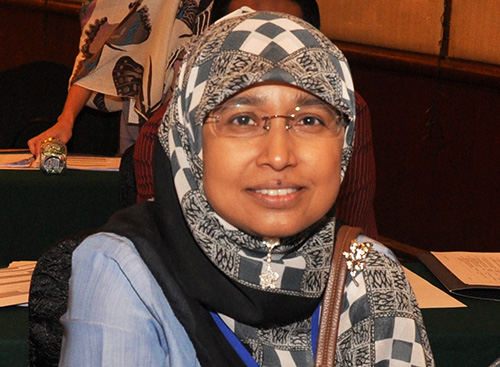There has been growing recognition that the global HIV community has not done enough to prepare patients, families, and providers for the transition of children into adult life and from pediatric to adult HIV care. TREAT Asia has worked with the International AIDS Society’s Collaboration on Paediatric HIV Education and Research (CIPHER) initiative as both seek to address this gap through research and advocacy.
CIPHER conducted a global HIV transition research workshop on April 6, 2016, in Budapest, Hungary, that brought together researchers to present data on youth outcomes and share models for how to improve transition implementation. TREAT Asia Director Dr. Annette Sohn helped organize the meeting and gave the opening lecture, outlining the challenges involved in ensuring that young people living with HIV can successfully grow up as individuals and grow out of pediatric care services.
 Dr. Thahira Jamal Mohamed, Hospital Kuala Lumpur, MalaysiaOne of the workshop presenters was pediatric network investigator Dr. Thahira Jamal Mohamed from Hospital Kuala Lumpur, Malaysia. She discussed her center’s model for transitioning adolescents, which involves holding a regular adolescents-only clinic staffed by an HIV physician from Sungai Buloh Hospital, their primary referral center and a TREAT Asia adult research network site. By bringing the adult physician to the adolescent patients, the program is able to allay fears about developing relationships with new providers, and to build trust and confidence in the process. Their team is also participating in the Study of Transitioning Asian Youth (STAY) project that TREAT Asia launched in March 2016, and will enroll young adults to learn how they have been doing since making the move to the adult HIV clinic.
Dr. Thahira Jamal Mohamed, Hospital Kuala Lumpur, MalaysiaOne of the workshop presenters was pediatric network investigator Dr. Thahira Jamal Mohamed from Hospital Kuala Lumpur, Malaysia. She discussed her center’s model for transitioning adolescents, which involves holding a regular adolescents-only clinic staffed by an HIV physician from Sungai Buloh Hospital, their primary referral center and a TREAT Asia adult research network site. By bringing the adult physician to the adolescent patients, the program is able to allay fears about developing relationships with new providers, and to build trust and confidence in the process. Their team is also participating in the Study of Transitioning Asian Youth (STAY) project that TREAT Asia launched in March 2016, and will enroll young adults to learn how they have been doing since making the move to the adult HIV clinic.
“Our hospital is pleased to be working with Sungai Buloh Hospital as part of this important initiative,” says Dr. Mohamed. “It is vital for adolescents transitioning to adult care to have the help they need to remain healthy and connected to appropriate support.”
“Transition has become one of the highest priorities for our pediatric program,” notes Dr. Sohn. “It has led to multiple projects to build youth leadership and strengthen our research portfolio around this critical period.”